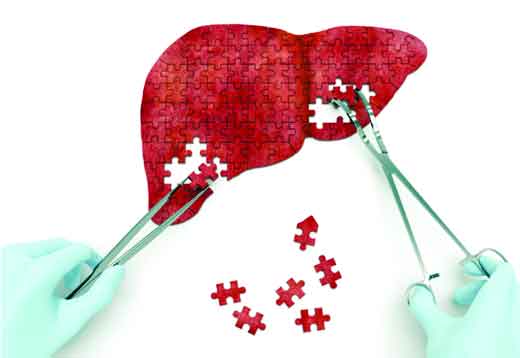When the tumour is small, that part of the liver can be surgically removed. Partial hepatectomy is only considered for people with otherwise healthy liver function
Liver cancer starts in the cells of your liver. Our liver is almost equal to a football-sized organ that sits in the upper right portion of our abdomen, beneath your diaphragm and above our stomach.
There are various types of cancer that can form in the liver. The most common type of liver cancer is hepatocellular carcinoma, which begins in the main type of liver cell (hepatocyte). Other types of liver cancer, such as intrahepatic cholangiocarcinoma and hepatoblastoma, are much less common.
Cancer that spreads to the liver is more common than cancer that begins in the liver cells. Cancer that begins in another area of the body — such as the colon, lung or breast — and then spreads to the liver is called metastatic cancer rather than liver cancer. This type of cancer is named after the organ in which it began — such as metastatic colon cancer to describe cancer that begins in the colon and spreads to the liver.
Symptoms: Most people don’t have signs and symptoms in the early stages of primary liver cancer. When signs and symptoms do appear, they may include:
- Weight loss
- Loss of appetite
- Upper abdominal pain
- Nausea and vomiting
- Weakness and fatigue
- Abdominal swelling
- Yellow discoloration of your skin and the whites of your eyes (jaundice)
- White, chalky stools
Causes: The exact cause of liver cancer is not known.
However, most cases are linked to scarring of the liver, also referred to as cirrhosis.People with both hepatitis B or C have a significantly higher risk of developing liver cancer. Some inherited liver diseases, such as hemochromatosis, cause cirrhosis and also increase the risk of liver cancer.
Other risk factors for liver cancer development include:
Diabetes: People with diabetes, especially if they also have hepatitis, or regularly consume a lot of alcohol, are more likely to develop liver cancer.
Family history: If a person’s mother, father, brother, or sister has had liver cancer, the person has a higher risk than others of developing the cancer themselves.
Alcohol intake: Consuming alcohol regularly and in excessive amounts is one of the leading causes of cirrhosis.
Treatment: For people who have early-stage liver cancer that can be treated, only surgery that removes the tumours completely will lead to a chance of recovery.
Surgical options include the following:
Partial hepatectomy: When the tumour is small and occupies a small part of the liver, that part of the liver can be surgically removed. Partial hepatectomy is only considered for people with otherwise healthy liver function. This procedure is often not an option, as the cancer has spread to other parts of the liver or other organs in the body.
Liver surgery of this scale can lead to excessive bleeding and blood-clotting issues, as well as infections and pneumonia.
Liver transplant: Candidates for a liver transplant cannot have a tumour larger than five cm or several tumours larger than three cm. The risk of the cancer returning is too great to justify a procedure as risky as a transplant if the tumor is larger than this.
With a successful transplant, the risk of cancer returning is greatly reduced, and normal function can be restored.
The writer is Dr arun kumar verma Senior Oncologist max hospital, New delhi


























